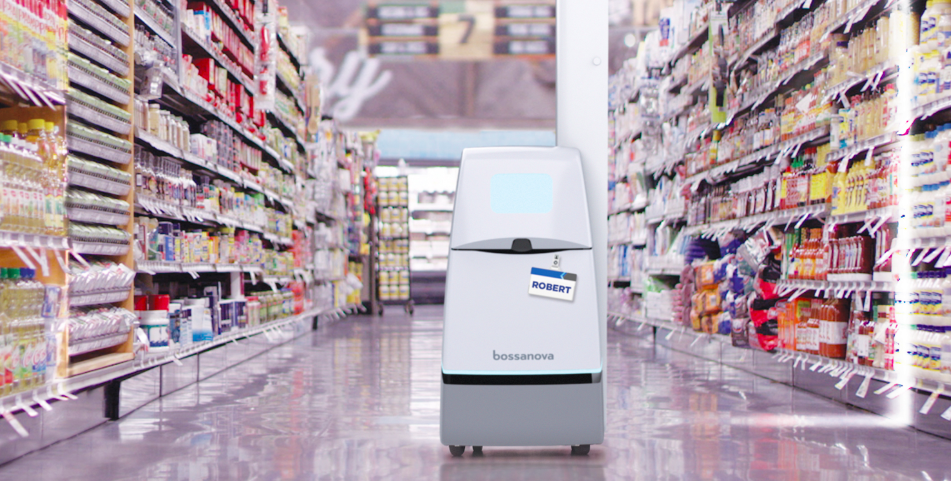Bossa Nova is set to revolutionize the way retailers track their inventories and people shop for every product.
The company was launched by LebNet member Sarjoun Skaff, who was listed among the 10 people transforming the retail industry by Business Insider.
Bossa Nova develops robots that navigate stores and provide real-time on-shelf product data for the retailer. It is currently deployed in 50 stores across the United States.
Founder Skaff chatted with LebNet about his business, overcoming near-death experiences, future plans and more.
You graduated and started Bossa Nova without any previous work experience. What factors helped you kick off the business? How did luck play a role?
Luck played a huge role but sometimes in its absence! The founding team’s lack of industry knowledge led us to develop the wrong product. Luckily, we received industry feedback early enough that we quickly scrapped the initial plan, retooled, and replaced the initial product with two that succeeded in the market. More than anything, I credit our resilience for allowing us to overcome near-death experiences and live to fight another battle.
Today Bossa Nova’s robots offer services different from what they offered before. Why did you decide to pivot your model?
We started building and commercializing robot toys. They were powered by the robotic technology developed at Carnegie Mellon University, were interactive and even connected to the cloud back in 2011! They were a remarkable technical success but in some ways were ahead of their time. Many products succeeded in the market but some didn’t, and those can be costly. In 2012, after a good run of five years and selling more than half a million robots, we decided to turn our attention to a business to business (B2B) model. This model has drastically less market risk and played well to our strengths in robotics and AI.
You received a lot of media attention recently after being named one of the top 10 people transforming the retail industry. Can you tell how exactly is Bossa Nova disrupting the industry?
Retailers around the world suffer from a lack of visibility into their store operations which translate into inventory distortion. Is this product on the shelf? Is it in the right location? Is the price correct? We solve this problem by automating the capturing and processing of on-shelf inventory data. Our fully autonomous robots roam the grocery aisles, take high-resolution pictures of every product on every shelf, and use AI in the cloud to extract inventory information and direct store associates to quickly correct the problems.
We’re seeing Bossa Nova’s technology being adopted as a productivity tool. For example, when a shift starts, store associates already know what to restock and fix on the floor. Team members can spend more time addressing issues and serving the customer. Shoppers are also able to find the products they need when they need them.
Introducing a new product in the market poses its own challenges, especially if the product is a robot roaming the stores and interacting with human beings. Can you describe some of the challenges you faced at the beginning and how did you deal with them?
The biggest challenge we face and to some extent still do is that the retail robot market does not exist. We pretty much created it. Since 2013, we had to convince retailers that robots are the right means of data capture in stores, that they were safe and friendly to everyone, and to investors that brick and mortar stores were here to stay despite the rise of Amazon and e-commerce. It faced a desert crossing and here again, resilience was key to pulling through.
Amongst the big names you’re working with, you partnered this year with Walmart to operate your robots at their stores. How did that partnership take place?
We exhibited a rudimentary version of the current solution at the National Retail Federation trade show in New York and caught the eye of virtually all retailers. Walmart approached us and has since proved to be an incredible partner. Through trial and error, we invented a new solution for retailers everywhere that we’re so incredibly proud of.
Manufacturing is a tough industry and many entrepreneurs often complain about the difficulty of finding the right manufacturing partner. Was it the same for you?
It was hard because robot manufacturers did not exist in the US when we started. We had to build a lot of the manufacturing engineering in-house and pass on the knowledge to manufacturers who were willing to take on such a complex system.
Last but not least, what are your future plans?
Our mission is to map the retail world so we’re just getting started. We are working hard to perfect our technology, scale the AI, expand coverage within a store, and develop solutions for different store formats. We have many more years of core innovation ahead of us to help the industry serve the shopper of tomorrow, and we’re excited.

